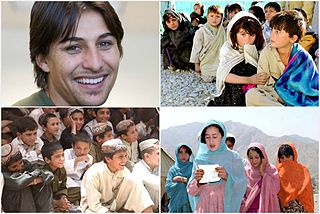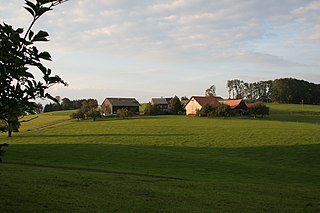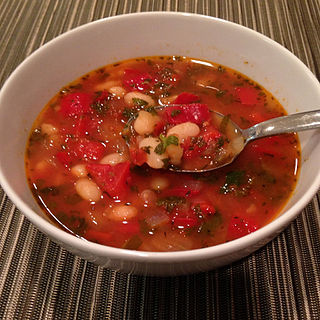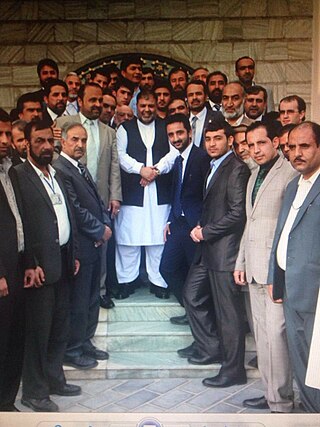
Afghans or Afghan people are nationals or citizens of Afghanistan, or people with ancestry from there. Afghanistan is made up of various ethnicities, of which Pashtuns, Tajiks, Hazaras, and Uzbeks are the largest. The two main languages spoken by Afghans are Persian and Pashto, and many Afghans are bilingual in speaking fluent Dari and Pashto.

Pashtuns, also known as Pakhtuns, or Pathans, are a nomadic, pastoral, Eastern Iranic ethnic group primarily residing in northwestern Pakistan and southern and eastern Afghanistan. They historically were also referred to as Afghans until the 1970s, after the term's meaning had become a demonym for members of all ethnic groups in Afghanistan.

Dari, also known as Dari Persian, is the variety of the Persian language spoken in Afghanistan. Dari is the term officially recognised and promoted since 1964 by the Afghan government for the Persian language; it is known as Afghan Persian or Eastern Persian in many Western sources. The decision behind renaming the local variety of Persian was more political than linguistic to support an Afghan state narrative. Apart from a few basics of vocabulary, there is little difference between formal written Persian of Afghanistan and Iran; the languages are mutually intelligible. The term "Dari" is officially used for the characteristic spoken Persian of Afghanistan, but is best restricted to formal spoken registers. Afghanistan's Persian-speaking population still prefer to call their language "Farsi", asserting that the term "Dari" has been imposed upon them by the dominant Pashtun ethnic group as an effort to detach Afghanistan from its deep-rooted cultural, linguistic, and historical connections with the wider Persian-speaking world, encompassing Iran, Tajikistan, and parts of Uzbekistan. Dari is the official language for 35 million Afghans in Afghanistan and it serves as the lingua franca for interethnic communications in Afghanistan.

Pashto is an Eastern Iranian language in the Indo-European language family, natively spoken in northwestern Pakistan, southern and eastern Afghanistan, and some isolated pockets of far eastern Iran near the Afghan border. It has official status in Afghanistan and the Pakistani province of Khyber Pakhtunkhwa. It is known in historical Persian literature as Afghani.

A hamlet is a human settlement that is smaller than a town or village. This is often simply an informal description of a smaller settlement or possibly a subdivision or satellite entity to a larger settlement.

Balkh is one of the 34 provinces of Afghanistan, located in the north of the country. It is divided into 15 districts and has a population of about 1,509,183, which is multi-ethnic and mostly a Persian-speaking society. The city of Mazar-i-Sharif serves as the capital of the province. The Mazar-i-Sharif International Airport and Camp Marmal sit on the eastern edge of Mazar-i-Sharif.

A tava(h) / tawa(h) (mainly on the Indian subcontinent), saj (in Arabic), sac (in Turkish), and other variations and combinations thereof, is a metal-made cooking utensil. The tawa is round and can be flat, but more commonly has a curved profile, and while the concave side can be used as a wok or frying pan, the convex side is used for cooking flatbreads and pancakes.
Bhāvanā literally means "development" or "cultivating" or "producing" in the sense of "calling into existence". It is an important concept in Buddhist practice (Patipatti). The word bhavana normally appears in conjunction with another word forming a compound phrase such as citta-bhavana or metta-bhavana. When used on its own, bhavana signifies contemplation and 'spiritual cultivation' generally.

Farhad Darya is an Afghan singer, composer, music producer, and philanthropist. Active since the 1980s, Darya has been one of the most renowned and influential Afghan pop musicians of the modern era, contributing to establishing new wave in Afghanistan and blending urban and rural styles. Darya's career has spanned multiple genres - including semi-classical ghazal, pop, folk, and rock - as well as both his native languages Dari Persian and Pashto as well as Uzbek, Hindi and English.

Nowshera is the capital city of Nowshera District in the Khyber Pakhtunkhwa province of Pakistan. It is the 78th largest city in Pakistan and ninth largest city in the province of Khyber Pakhtunkhwa.
Jamrūd or Jam is a town in the Khyber District of Khyber Pakhtunkhwa, Pakistan. Located in the Valley of Peshawar, on the western fringe of Peshawar city, Jamrud is the doorway to the Khyber Pass which is just to the west of the town. The pass connects Jamrud with Landi Kotal to the west, located near the border of Afghanistan's Nangarhar Province.
Islamic poetry is a form of spoken word written & recited by Muslims. Islamic poetry, and notably Sufi poetry, has been written in many languages including Urdu and Turkish.

Chorba or shorba is a broad class of stews or rich soups found in national cuisines across the Middle East, Maghreb, Iran, Turkey, Southeast Europe, Central Asia, East Africa and South Asia. It is often prepared with added ingredients but served alone as a broth or with bread.

Lemar is a television station based in Kabul, Afghanistan, which was founded in 2006. It is owned by MOBY Group. The channel broadcasts news, shows, and entertainment programs in the Pashto language. Its sister channels are TOLO TV and TOLOnews.
The mass media in Afghanistan is monitored by the Ministry of Information and Culture (MoIC), and includes broadcasting, digital and printing. It is mainly in Dari and Pashto, the official languages of the nation. It was reported in 2019 that Afghanistan had over 107 TV stations and 284 radio stations, including 100s of print media and over 1,800 online media outlets. After the return of the Islamic Emirate of Afghanistan (IEA) in 2021, there was a concern that the mass media will significantly decrease in the country. The number of digital media outlets is steadily increasing with the help of Facebook, Instagram, TikTok, Twitter, YouTube, and other such online platforms. IEA's spokesman Zabihullah Mujahid suggested that the media should be in line with Sharia and national interests.

Abdul Karim Khoram is Afghan President Hamid Karzai's Chief of Staff. As the presidential chief of staff, Khoram controls the Government Media and Information Center (GMIC) and therefore the Afghan government's message.

The Pashto alphabet is the right-to-left abjad-based alphabet developed from the Arabic script, used for the Pashto language in Pakistan and Afghanistan. It originated in the 16th century through the works of Pir Roshan.
Sajāwand is a village in Baraki Barak district, Logar province, Afghanistan.

ʿAbū ʿAbdullāh Muhammad Ibn ʿAbū Yazīd Tayfūr Sajāvandī Ghaznavī, also known as Abū al-Fazl as-Sajāwandī al-Qāriʾ was a 12th-century Islamic scholar, mystic, Qāriʾ and theologian. He is primarily known for his contributions to the Islamic traditions of recitation and pronunciation, creating a set of rules and markers used to indicate the pronunciation and pauses of Quranic recital, known as Sajawandi stop signs or Rumuz al-Awqaf as-Sajāwandī. He is also credited as being the first known person to use coloured circles as a means of separating verses in the Quran, a design choice which has persisted til today, with the addition of a verse number inside of the circle. In Persian, the term muṣ·ḥaf sajāwandī مُصْحَف سَجَاوَنْدِي may today be used to denote an elegantly written Quran, accounting for the association between Sajawandi and his use of lavish red and golden dots as pause markers. His son Ahmad ibn Muhammad Sajawandi was also a well-known chronicler, commentator on the Quran, poet and orator.
Kulangār/ Kolangar is a village in Pul-i Alam District, Logar province, Afghanistan.















